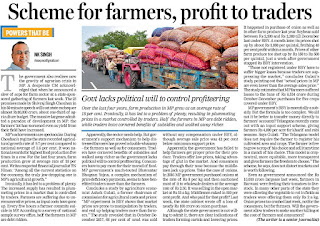NK SINGH
The government
also realises now the gravity of agrarian crisis in Madhya Pradesh. A desperate
chief minister acknowledged that when he announced a slew of sops for farm
sector at a State-sponsored gathering of farmers last week.
The 23 promises
made by Shivraj Singh Chouhan in his 50-minute speech will cost state exchequer
almost Rs. 10,000 crore, about one-third of agriculture budget.
The massive largesse
admitted a paradox of development in MP: the farmers’ lot has worsened even as yield
from their field have increased.
MP’s achievements are
spectacular.
During Chouhan’s regime the state recorded agricultural growth
rate of 9.7 per cent compared to national average of 3.6 per cent. It won
national awards for highest food production five times in a row. For the last
four years, farm production grew at average rate of 18 per cent.
Writes
respected financial journalist TN Ninan: “Among all the current statistics on
the economy, the truly jaw-dropping one is MP’s agricultural growth.”
Problem of plenty
Ironically, it
has led to a problem of plenty. The increased supply has resulted in plummeting
prices in a market that is controlled by traders.
Farmers are suffering due to
un-remunerative prices, as input costs have gone up. Every five hour a farmer
commits suicide in MP. According to a survey of national sample survey office,
half the farmers in MP are debt ridden.
Apparently, the
sector needs help. But government’s support mechanism to help distressed
farmers has proved a double whammy – for farmers as well as for consumers.
Traders
have cornered benefits of subsidies and walked away richer as the government lacks
political will to control profiteering. Consumers have to pay more for their
morsel of food.
MP government’s much-touted Bhavantar Bhugtan Yojna, a complex
mechanism of price deficiency payments, seems to have benefitted traders more
than the farmers.
Traders manipulate market
Concludes a
study by agriculture economist Ashok Gulati, a former chairman of commission
for agricultural costs and prices: “MP experiment in BBY shows that market
prices are prone to manipulation by traders, and end up helping traders more
than farmers.”
The study revealed that in October-December 2017, 68 per cent of
urad was sold without any compensation under BBY, although average sale price
was 42 per cent below minimum support price. In the case of soybean, whose
average sale price was 12 per cent below MSP, 82 per cent produce was sold without
BBY compensation!
Apparently, the
government has failed to help farmers get proper price for their produce.
Traders offer low prices, taking advantage of glut in the market. And consumers
pay through their nose because the middlemen jack up prices.
Take the case of
onions. In 2016 MP government purchased onions at the rate of Rs 8 per kg and
then auctioned most of it to wholesale dealers at the average rate of Rs 2.50. It
was selling in the open market at Rs 13 a kg. Middlemen raked in 500 per cent
profit.
And who paid for that profit? Last week, the state cabinet wrote off a
loss of nearly Rs 100 crore on onion purchase.
Farmers lost Rs 6,534 crore due to Bhavantar
Although the state
government is not willing to admit it, there are clear indications of traders
forming cartels and lowering prices.
It happened in purchase of onion as well
as in other farm produce last year.
Soybean sold between Rs 2,580 and Rs 2,380
till December last under BBY. A month later, its prices shot up by about Rs
1,000 per quintal, fetching 40 per cent profit within a month.
Prices of other
farm produce too shot up by Rs 150 to Rs 500 per quintal, just a week after
government stopped its BBY intervention.
“Those not
registered under BBY have to suffer bigger losses because traders are
suppressing the market,” concludes Gulati’s study, pointing out that “actual
prices in MP are even lower than the average sales price.”
The study estimates that
MP farmers suffered losses to the tune of Rs 6,534 crore during
October-December purchases for five crops covered under BBY.
Telangana gives direct susidy
MP
Government’s BBY is essentially a subsidy. But the formula is too complex.
Would not it be better to transfer money directly to farmers’ accounts?
Telangana recently came out with an input support scheme, giving farmers Rs
4,000 per acre for kharif and rabi seasons.
Says Gulati: “The Telangana model
does not require the farmer to register his cultivated area and crops. The
farmer is free to grow a crop of his choice and sell it anytime in a mandi of
his choice. This model is crop-neutral, more equitable, more transparent and
gives farmers the freedom to choose.” The scheme, he says, does not distort
markets and is worth following.
Even
as government announced the Rs 10,000 crore largesse last week, farmers in
Barwani were feeding their tomatoes to livestock. In many other parts of the
state they were allowing the vegetable to rot in fields as traders were offering
them only Rs 2 a kg.
Onion prices too crashed last week, not for the consumers,
but for farmers.
Will the government allow traders to make another killing at
the cost of farmers and consumers?
Powers That Be, my column in DB Post of 19 February 2018.
nksexpress@gmail.com
Tweets @nksexpress


Comments
Post a Comment
Thanks for your comment. It will be published shortly by the Editor.